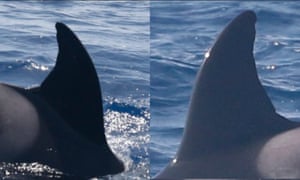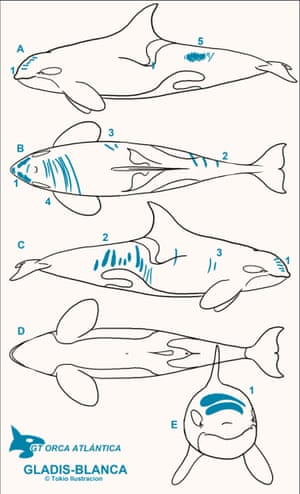Experts investigating a series of extraordinary encounters between orcas and yachts off the coasts of Spain and Portugal believe the animals responsible may have been triggered to target boat rudders by an earlier “aversive incident” involving some kind of vessel.
Since 10 August, crews sailing off the Spanish region of Galicia have reported 22 interactions with orcas – also known as killer whales – a third of which have resulted in varying degrees of damage to their boats. In a handful of cases, boats have been left with damaged steering systems.
After studying photos and video footage of the encounters, a working group of Spanish and Portuguese experts, including marine biologists and government officials, has identified three orcas present in 61% of the incidents.

Underwater photographs of the three animals, nicknamed Black Gladis, White Gladis and Grey Gladis, reveal that two of them appear to have suffered wounds between June and August. Although some of the injuries would have been acquired as the orcas tried to snatch tuna off long fishing lines, others could have been from contact with boats.
According to the investigators, killer whales tend to be curious about the sterns of boats because of their noise and movement. But they say the recent encounters are “unprecedented” because of the damage inflicted on the yachts.

“The trigger for this strange and novel behaviour could have been an aversive incident that the orcas had with a boat, and in which the speed of the boat could have been a critical factor,” the working group said in a statement on Tuesday.
“For the moment, we have no clear evidence of when it happened, nor can we say for sure what kind of boat may have been involved, nor whether the incident was accidental or deliberate.”
As a result of the possible incident, said the researchers, the orcas may have felt compelled to act when they saw a sailboat in order to to slow it down by going after its rudder.
But they acknowledge that yachts may also have been targeted because they are easier for the orcas to take on than larger craft. They added that the killer whales could simply be toying with sailboats “out of curiosity” now that they had discovered the ability to slow or stop a large moving object.
Although some crews have been shaken by the encounters, the working group pointed out that no one had been injured.
“Rough movements of the wheel and sharp movements have upset crews unfamiliar with orcas and their behaviour,” said the experts.
“[But] in no instance has anyone been harmed by the direct activity of the orcas – although there has been some risk in some of the situations involving long-lasting or nocturnal activity.”
Such incidents led Spanish maritime authorities to ban yachts of less than 15 metres in length from a stretch of water off Galicia for a week at the end of last month.
Orcas are usually spotted off Galicia in September each year when they make their way up from the Gulf of Cadiz and follow tuna into the Bay of Biscay.
The animals can weigh up to six tonnes and live for up to 80 years.